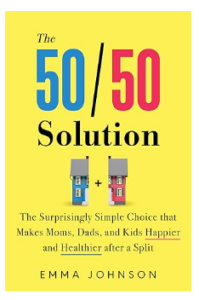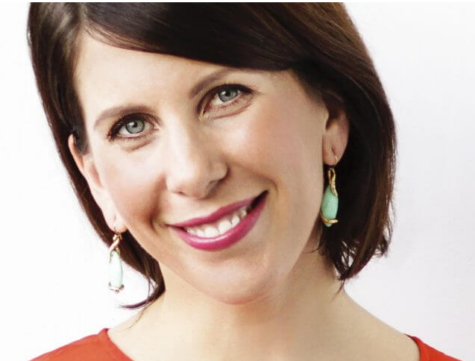Hi Folks! I wrote this piece for my syndicated column, but am posting it here because it gets at one of the core beliefs not just tearing divorced families further apart, but driving many parents mad with guilt and worry: The idea that kids need a mega-dose of MOM to grow up healthy.
The Solomon of Divorce
“Relationships don’t last anymore,” observed comedian Rita Rudner. “When I meet a guy, the first question I ask myself is, ‘Is this the man I want my children to spend their weekends with?’”
Great joke – horrible reality. But a new solution is on the horizon. After years of research, writer/activist Emma Johnson has come up with the best answer to the question of which parent should get majority custody of the kids after a divorce. You can guess it from the title of her new book: “The 50/50 Solution: The Surprisingly Simple Choice that Makes Moms, Dads, and Kids Happier and Healthier after a Split.”
“Whether they live in separate homes by divorce, separation, or maybe they were never together in a relationship to begin with, a 50/50 schedule is what is going to be best for the children’s outcomes,” says Johnson, the Solomon of divorce. But it’s also “best for the moms, in terms of their income-earning ability and well-being. And it’s really what’s best for dads and men.”
“I bought into it myself.”
Johnson has spent more than a decade running the wildly popular WealthySingleMommy blog, advising moms struggling with money, childcare, and dating issues. Part of the problem, she quickly realized, is that the culture has come to believe it’s a no-brainer that divorced moms should get majority custody of the kids.
But there’s really no real reason for that assumption, says Johnson, a divorced mom herself. That model was based on “these old, dated ideas about attachment — the idea that more time with mom, with one single caregiver [is best]. I bought into that idea myself,” she admits.
In fact, bonding with both parents is better, because when the dad is truly a co-parent, he is far more likely to stay in the children’s lives. “And father-absence is a huge, huge risk factor for kids that plays out throughout their lives,” Johnson says.
The weekends-only model “signals to the dad that he doesn’t matter because he’s got the kids 30% of the time,” says Johnson. It signals this to the kids, too.
Day-to-day parenting.
Relegated to second-tier status and absent from day-to-day family life, dads are more likely to drift away. Bonding comes from dealing with “the good and the bad. Getting your 4-year-old to get their shoes on and out the door. You fight about bath time and you get to have that snuggle bedtime story,” Johnson says. Without that whole spectrum, dads “don’t develop as parents.”
The weekends-only arrangement is stunting them.
What happens when the arrangement is 50/50? Johnson points to Kentucky, an early adopter of the equal parenting law. After it passed, she says, domestic violence filings went down. So did child abuse.
In Ohio, where some districts have adopted the 50/50 law and others haven’t, her research found the same thing: In the 50/50 pockets, “substantiated child abuse charges were lower.”
New laws on the horizon.
Right now there are dozens of bills throughout the U.S. that would make equal parenting schedules the default. Who is against them? Sometimes divorce lawyers, Johnson believes. After all, they do best when parents keep fighting. She also blames the old-school notion that, in a divorce, it is the dad’s job to give their exes’ space and money, period.
But in truth: only 40% of child support ever gets paid. And for struggling families, that support can amount to just a couple hundred dollars a month, Johnson says. In which case, having childcare half the week would allow moms to make more than that.
“Historically,” Johnson says, “divorce was a fight and how do you win? You take his money and you take his kids and then you win.” But with a 50/50 law, “You take the fight out of it.” You keep both parents in, which keeps the divorced family, in its own way, intact.





2 Comments
I am intrigued by the findings about domestic violence and child abuse. Would love to see additional studies as more states adopt this, and more detailed longitudinal data over the next 10 to 20 years.
This may be an obvious critique, but my first thought on this is that there are practical reasons why this may not always be feasible. When my parents divorced, Mom and I stayed in Delaware where we had moved to be close to her job, and Dad moved back to New Jersey to be closer to his job. I spent every other weekend and summers with my Dad, but this required me to travel an hour and a half each way by train. Never mind that I was nine and went by myself, as I have already written about that on this site earlier. Other kids of divorce that I knew had similar situations where the kids had to travel to see their fathers. The only way you could do 50/50 parenting is if you live near enough each other that your children can attend the same school, go to the same doctor, see the same friends, etc. when living with each parent. Your child can’t go to two different schools for half the week. If you do live close together then I think this sounds like a wonderful solution. I am glad that divorced fathers are getting more of a chance to continue being a primary parent.
You may not have been implying anything with this, but the part about “You take his money, you take his kids and you win” is a negative stereotype about women and their reasons for divorce. For a long time many men were not prepared or willing to do as much parenting as women. It was just part of the culture for so long, that these attitudes have only changed gradually. Men never used to be expected to take time off from work or leave early to take care of kids. Now that this is catching up it is only right that men should have more of the rights as well as the responsibilities of parenting.
I was lucky that my parents’ divorce was amicable, that they agreed on everything right away, and that my father was always deeply involved in my life. Although the divorce itself broke my heart in a way that I don’t think ever healed, at least the aftermath wasn’t rancorous.
Excellent artcle–for Moms. As is its purpose, I gather. And I agree a big place for this.
Ultimately, courts and law are rightly geared toward, supposed to serve, what’s best for each child. This can be what’s best to for the Mom, or Dad, ideally both.
Even so, I have seen a shared custody arrangement, without any lingering rancor apparent to me, leaving my divorced GF with much guilt toward her kids. Inclining all the mor toward IMO oppressive helicotering. This over 20 years ago.
Meaning in no way blamable on e.g. smartphones.
She loved them very much.
FWIW, her guilt including feeling her kids were overall deprived of maternal attention. But I saw no clamoring from them for more. To the contrary. I liked to go along and help, keep my Mom company when she went out for groceries, etc. No mater all the FRing freedom, independence my parents happily afforded me. These kids wanted to stay home. Did not even help her bring in the groceries.